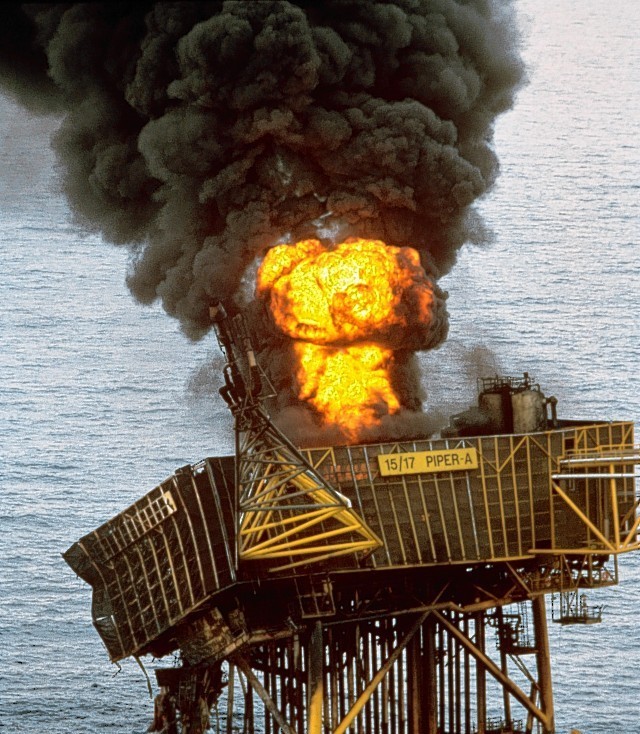The UK Government abandoned plans to invest extra cash in North Sea safety two years before the Piper Alpha disaster – because it was not deemed a priority.
Newly-released files show that Margaret Thatcher’s energy secretary highlighted the need to spend more on the sector in 1986.
But Peter Walker, the minister at the time, said he had decided against asking the Treasury for any additional money after having “carefully reviewed my priorities”.
The revelations from the National Archives – published today under the 30-year rule – were described by one Piper Alpha widow as “beyond disgraceful” last night.
Ann Gillanders, who lost her 50-year-old husband Ian, an engineer, when the platform exploded in 1988, said the findings underlined the government’s attitudes to the sector at the time.
Mrs Gillanders, of Nairn, a founder member of the Piper Alpha Families and Survivors Association, added: “The tragedy might never have happened and the disaster might have been averted if they had paid more attention to where they were putting their money.
“The mindset at the time was to get it (the oil) out at all costs.
“There was a conflict of interest at the time in that it was the Department of Energy responsible for getting the money out of the North Sea as well as being responsible for safety.
“I think a lot of people working there at the time had concerns but if you raised them you found yourself out of work. There was no one then to represent them.
“I sat for days and days and days at the Cullen Inquiry listening about safety and what had not happened.
“The families are fully aware that safety was not a priority. This is now bringing that further out into the open.”
An explosion and subsequent fires on the Piper Alpha platform caused the deaths of 167 men on July 6, 1988, in what was the world’s worst offshore disaster.
The Cullen Inquiry into the tragedy led to no less than 106 recommendations for changes to North Sea safety procedures.
Two years before the disaster, UK Government ministers were considering their budgets for the following year amid a major public spending squeeze.
A file at the National Archives in London contains a letter written by Mr Walker to John MacGregor, then the chief secretary to the Treasury, on May 29, 1986.
He wrote: “The need for R&D into offshore safety remains, though there are beginning to be indications that it may be difficult to continue to secure large contributions to it from the oil industry.
“And it remains essential for the long-term health of the UK offshore supplies industry that my department join with them in R&D to help give them a technological ‘edge’.
“Nevertheless, after taking all these factors into account, and having carefully reviewed my priorities, I can tell you I do not intend to seek net additional PES (public expenditure system) resources for my department over the survey period.”
Mr Walker went on to complain at length in the letter about the “major uncertainty overhanging our administrative expenditure relating for the need for my department to vacate its current HQ building in a few years time”.
He said: “At this stage it must be anyone’s guess where we will end up.”
Frank Doran, Labour MP for Aberdeen North, said the letter underlined the “toxic mixture of industry resistance, a weak regulator and the low oil price” which preceded the tragedy.
Asked if extra investment could have helped prevent the deaths, he said: “Many people affected by the disaster believe that if we had had a stronger regulator, and if the secretary of state had acted on his intention, then it may not have happened.”
Kevin Stewart, SNP MSP for Aberdeen Central, said: “It’s outrageous that a Tory energy secretary was more interested in obtaining cash for new office space for him and his staff than he was about spending on research and development into improving offshore safety.
“The contents of these released papers will be particularly galling for those who have lost friends and family in the Piper Alpha disaster and in other North Sea incidents as increased spending on safety may have saved the lives of their loved ones.”
Shadow Energy Minister Tom Greatrex said: “These revelations from the National Archive are an important reminder of the complacency about health and safety that was endemic in the North Sea prior to Piper Alpha.
“The Thatcher government’s decision not to pursue further investment into North Sea health and safety – just two years before this fatal tragedy – will be a distressing revelation to those who lost loved ones and colleagues on Piper Alpha.”
